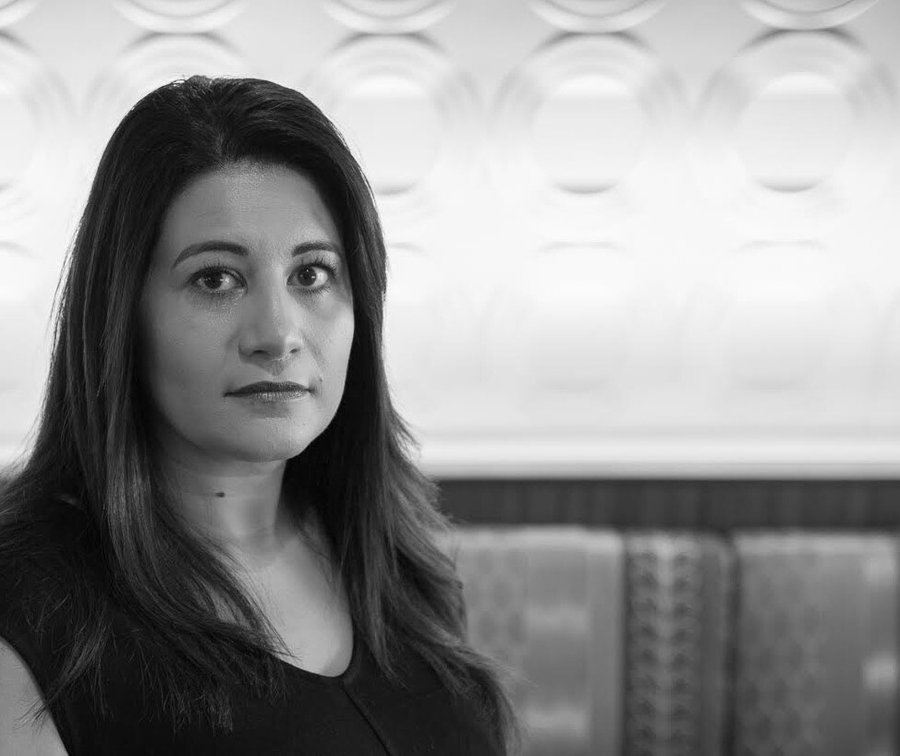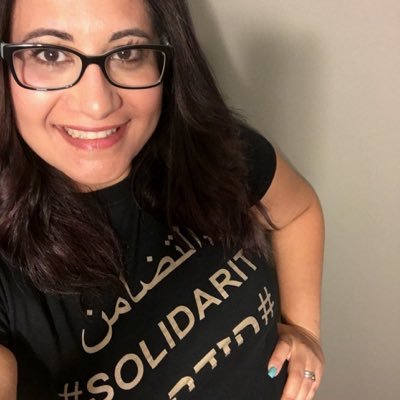Trapped in A Marriage with an Al-Qaeda Operative, Yasmine Fought Back for the Sake of Her Daughter

Yasmine Mohammed is an Arab-Canadian college instructor, activist, podcaster and writer. Yasmine shares her story of growing up in an Islamic fundamentalist home and then being forced into marriage. She now works to offer hope to ex-Muslims, atheists and freethinkers. Through our campus program, we work with Yasmine, and other ex-Muslims and Muslim reformers, to apply challenge Islamist ideology. The opinions stated below are those of Yasmine and do not necessarily represent the views of the AHA Foundation.
I was born into a marriage that was on its last legs. My parents moved from California to Vancouver, Canada to raise their children in a quiet environment far away from the free love culture of 1960s San Francisco. They were actually separated when my mom discovered she was pregnant with me. She hoped that this news would cause my father to reconsider, but he still left her. He left her with three children in a city she was unfamiliar with, in a country she was uncomfortable in.
My mother, who was born and raised in Egypt, went looking for support and community, and unfortunately this quest caused her to gravitate towards the local mosque. In that mosque, she met a man who was already married, and already had three children, but who offered to take her on as his second (concurrent) wife. In Islam, a man can have up to four wives. His French-Canadian convert wife accepted this arrangement.
I was around five or six years old when this man entered our lives. I had no idea why my mom was accepting of all his brutality. He demanded that she wear a scarf on her hair, which was very strange to us, and it made me angry that he was changing my mother. Soon after, he sat us down and broke all of our records in front of us. I sat there helplessly as he snapped Kenny Rogers, Hank Williams, and Dolly Parton into pieces. My mother just stood there with her hands clasped, looking at the carpet, avoiding our eyes and ignoring our questions.
“Music is haram!” he bellowed.
I had never heard that word before, yet I heard little else but that since that day. Haram means forbidden. From that moment on practically everything was forbidden – I could no longer have birthdays, ride my bike, go swimming, join in hot dog day at school, or play with my friends down the hall of our apartment building – as they were non-Muslims. Befriending non-Muslims was also haram.
All of these things that were taken away were replaced with five daily prayers and memorization of the Quran. Every morning we were woken up to pray fajr, the prayer that must be performed before sunrise, and then in the hours as we waited for school, we had to sit and rock back and forth as we memorized foreign sounds from an ancient text. We had no idea what we were saying. But that fact was irrelevant. The objective was not to learn or understand; the objective was to regurgitate.
Eventually, at the age of nine, I was strapped into a hijab as I was sent to our local Islamic school. The following years were a constant tug-of-war and turmoil as I consistently fought against this sick invasion of my life – but was simultaneously mind-numbingly terrified of resisting. Not only were the promises of torture in the grave, the Day of Judgment, and of Hell excruciatingly detailed, but the earthly punishments that I endured daily were threats that were consistently followed up on.
At the age of thirteen, I managed to involve social services and begged to be taken out of that home. I told them, and the police, and the judge of how we were severely beaten. I told them of how I was hung up upside down in our garage and how the bottoms of my feet were whipped.
They all knew.
Yet, after months of deliberating, the judge ruled that different cultures are free to discipline their children in different ways.
Because of their cultural norms, my family was excused from torturing me. I understood then that had I been a blond-haired, blue-eyed girl, my country would have protected me. But I was born into the wrong family. My skin was not the right color, and therefore I was not worth protecting.
I stopped fighting after that. I learned that what Allah wanted would transpire. Allah would make sure that I didn’t escape. And Allah would make sure that I be punished for trying. I went to infidels – the enemy – for help. There was never any excuse for that.
Years of depression and continued trauma later, I was forced into a marriage with a man that I barely knew. I was nineteen when my mother sat me down and told me that she was sick and tired of me and that she no longer wanted to deal with me. I was sick and tired of her too. After years of fighting, I thought maybe if I just listen to her, maybe she’ll actually like me… possibly love me as she loved my sister, who never stepped out of line. And perhaps he will be a decent man. I was so tired of fighting, and so out of options, that I gave in. I didn’t approve of the marriage, per se, but in Islam a woman’s silence is consent.
I sat there stoically with tears streaming down my face as the katb kitab, Islamic marriage, was performed.
After we were legally married, and I moved into his apartment, the beatings and the rapes began almost immediately. I would try to elicit my mother’s help, but she would only remind me of the verses in the Quran that clearly gave him permission to beat and rape me. Who was I to defy Allah’s commands? I withdrew inside myself under a black niqab that covered every bit of me, even my eyes. I also wore black opaque socks and black gloves delivered from Saudi Arabia.
I accepted my fate because I saw no other option.
My only reprieve was to imagine that this monster might give me a little girl. That would be the silver lining to this life of Hell. I would have a little girl to love and to love me and she will be my best friend.
Soon, I was pregnant, and shortly after my 22nd birthday, I was holding my very own little miracle. I loved her with more love than I ever knew was possible. She was everything to me. As I kissed her little fingers that were wrapped tightly around my finger, he leaned in and asked:
“Is she cleaned?”
“Yes, I just gave her a bath.” I responded.
“No, I mean, is she fixed?”
“I don’t understand what you mean…”
“No, no,” my mother interjected “We do that later. When she’s older.”
Then I understood. He was talking about female genital mutilation (FGM). He wanted to mutilate my little miracle. I responded with a defensive anger I didn’t know I still had in me. I would have jumped out the window with my baby to get her away from him. But my mother’s response was buying me some time.
“Ok. Well. We better do it right away. I will not have my daughter be unclean.”
“Yes, yes,” responded my mother, “we’ll take her to Egypt and have it done as soon as we can.”
That’s the moment I decided that I would get my daughter out before they had the chance.
With only a high school education and no support from anyone outside of my family, the Islamic community, I had no idea how I would get out, but I knew I needed to. I needed a plan.
When my daughter was about a year old, my mother began to bleed profusely from her nose and mouth simultaneously. I called 911 in hysterics. I thought she was going to die. When the ambulance arrived to take her away, I hesitated – I had never left the house without him. I knew he would be furious. But surely this was an extenuating circumstance? I grabbed my little girl and we rode in the ambulance with my mom.
When we arrived at the hospital, as I sat in the waiting room, I was approached by a man and a woman. They explained that they were from CSIS- essentially, the Canadian CIA. I didn’t even know we had an Intelligence Agency.
They told me that the man I married, Essam Hafez Marzouk, was an Al Qaeda operative who worked closely with Osama bin Laden.
In a pre-9/11 world, those words didn’t mean much to me. I knew he had been in Afghanistan before he came to Canada, so I suspected he had some ties to jihadis. Why else would an Egyptian teenager go to Afghanistan? But I had no idea of the extent of his involvement.
Through a series of convoluted events (that I will explain in detail in my upcoming book, From Al Qaeda to Atheism), I was finally able to escape from him and my family, with my daughter, and begin to study at university. At university, I took a History of Religions course that changed the trajectory of my life. That’s when I discovered that this book, which I believed to be the verbatim word of God, was simply a book of plagiarized stories. Without all the divinity attached to it, I was free to denounce that book and eventually the purported author as well.
Now, as a free woman, my advice to any girls under threat of being forced into a marriage is: don’t give up. In my day there was no social media. There was no one to reach out to. Today, you are privileged to have a network as vast as the planet itself.
Reach out for support and you will find it.
If you are facing honor violence, FGM, forced marriage or other forms of violence, please reach out to the AHA Foundation. If you are in a Muslim majority country, you can contact me through my website and I will get you involved in my Free Hearts, Free Minds program that will match you up with an ex-Muslim life coach who will help you find your inner strength and will arm you with the tools you need to fight back.
If you are an ex-Muslim in North America, you can contact EXMNA. If you are a Muslim, you can contact the group Muslimish in the US or Faith to Faithless in the UK. There are many organizations and individuals that will support you if you reach out.
Through my involvement with the AHA Foundation, I hope to offer a counter-narrative to the commonly heard trope of how Islam is a feminist religion and Mohammed was the first feminist. No religion can identify as feminist, least of all Islam. If we accept that this trope is true, we are then going to ignore the millions of women that are fighting for their freedom across the globe daily. Women that are forced to dress in a certain way. Women/girls that are forced into marriages or into having their bodies mutilated, all in the name of Islam.
These women have been ignored for over a century. Now that Islam is finally on the lips of politicians and the general public, this is our chance to finally reach out our hands in support. If we deny that there is this pervasive problem with misogyny in Islam, how will we ever hope to begin to solve the issue?


